| |
MEET THE FELLOWS CLASS OF
2014
The ISCB Fellows Program
recognizes members of the scientific community for their service and
their noteworthy contributions to the fields of computational
biology and bioinformatics.
Fellows are distinguished through
a rigorous process that includes a call for nominations by the ISCB
membership, selection by the Fellows Selection committee that is
comprised of the previously named Fellows.
The 2014 ISCB
Fellows are exemplary members of ISCB and the scientific community
and embody the Society's mission to advance scientific understanding
of living systems through computation. The research, teaching, and
service records of each Fellow shows how their contributions are
invaluable to the computational biology community.
Amos Bairoch
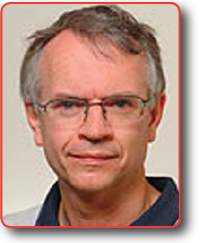 Amos
Bairoch is a Professor and Director of Bioinformatics in the Human
Protein Sciences department of the Faculty of Medicine at the
University of Geneva, Switzerland, and he is also a Group Leader at
the Swiss Institute of Bioinformatics in Geneva, Switzerland.
Bairoch completed his doctorate at the University of Geneva, and his
work has been dedicated to the field of protein sequence analysis.
Bairoch was a key developer of several seminal protein analysis and
prediction tools and databases including SWISS-prot, PROSITE,
ENZYME, and Expasy, and is one of Switzerland's most notable
bioinformatics researchers. Amos
Bairoch is a Professor and Director of Bioinformatics in the Human
Protein Sciences department of the Faculty of Medicine at the
University of Geneva, Switzerland, and he is also a Group Leader at
the Swiss Institute of Bioinformatics in Geneva, Switzerland.
Bairoch completed his doctorate at the University of Geneva, and his
work has been dedicated to the field of protein sequence analysis.
Bairoch was a key developer of several seminal protein analysis and
prediction tools and databases including SWISS-prot, PROSITE,
ENZYME, and Expasy, and is one of Switzerland's most notable
bioinformatics researchers.
. .
. . . . . . . . . . . . . . . . . . . . . . . . . . . . . . . . . .
. . . . . . . . . . . .
Ewan Birney
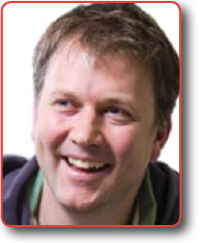 Ewan
Birney is an Associate Director at the European Molecular Biology
Laboratory-European Bioinformatics Institute (EMBL-EBI). Birney
completed his doctorate at the Wellcome Trust Sanger Institute,
Cambridgeshire, United Kingdom, and his research interests include
genomic variation, regulatory genomics, and next-generation
sequencing data analysis. Birney has been a key player in several
major genome projects and was involved in annotating the human,
mouse, and chicken genomes, and was a leader of the Ensembl genome
annotation project. Birney's outstanding contributions to genomics
research have been recognized through several awards, including the
2005 ISCB Overton Prize. Ewan
Birney is an Associate Director at the European Molecular Biology
Laboratory-European Bioinformatics Institute (EMBL-EBI). Birney
completed his doctorate at the Wellcome Trust Sanger Institute,
Cambridgeshire, United Kingdom, and his research interests include
genomic variation, regulatory genomics, and next-generation
sequencing data analysis. Birney has been a key player in several
major genome projects and was involved in annotating the human,
mouse, and chicken genomes, and was a leader of the Ensembl genome
annotation project. Birney's outstanding contributions to genomics
research have been recognized through several awards, including the
2005 ISCB Overton Prize.
. .
. . . . . . . . . . . . . . . . . . . . . . . . . . . . . . . . . .
. . . . . . . . . . . .
Nir Friedman
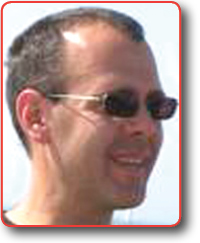 Nir
Friedman is a Professor in the School of Computer Science and
Engineering and the Alexander Silberman Institute of Life Sciences
at the Hebrew University of Jerusalem, Israel. Friedman earned his
doctorate from Stanford University in Stanford, California, United
States in the field of artificial intelligence, and he is well known
for developing methods that apply Bayesian statistics to
computational biology. Friedman's diverse research interests include
molecular networks, epigenetics, cell regulation, and disease.
Friedman's dual expertise in computation and biology has greatly
influenced the scope of his research and strengthened his
contributions to the computatational biology community. Nir
Friedman is a Professor in the School of Computer Science and
Engineering and the Alexander Silberman Institute of Life Sciences
at the Hebrew University of Jerusalem, Israel. Friedman earned his
doctorate from Stanford University in Stanford, California, United
States in the field of artificial intelligence, and he is well known
for developing methods that apply Bayesian statistics to
computational biology. Friedman's diverse research interests include
molecular networks, epigenetics, cell regulation, and disease.
Friedman's dual expertise in computation and biology has greatly
influenced the scope of his research and strengthened his
contributions to the computatational biology community.
. .
. . . . . . . . . . . . . . . . . . . . . . . . . . . . . . . . . .
. . . . . . . . . . . .
Robert
Gentleman
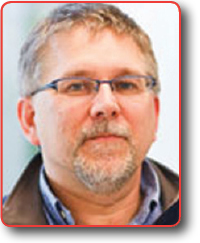 Robert
Gentleman is Senior Director of the Bioinformatics and Computational
Biology Department at Genentech in San Fransisco, California, United
States. Gentleman completed his doctorate in statistics from the
University of Washington, Seattle, Washington, United States and is
well known for being an originator of the R programming language and
Bioconductor, which are now some of the most widely used software
programs in bioinformatics. Gentleman's research is focused on
analyzing high throughput sequencing data to better understand
biological mechanisms, including work on detecting low frequency
mutations in tumors and gaining insight into RNA editing in various
tissues. Robert
Gentleman is Senior Director of the Bioinformatics and Computational
Biology Department at Genentech in San Fransisco, California, United
States. Gentleman completed his doctorate in statistics from the
University of Washington, Seattle, Washington, United States and is
well known for being an originator of the R programming language and
Bioconductor, which are now some of the most widely used software
programs in bioinformatics. Gentleman's research is focused on
analyzing high throughput sequencing data to better understand
biological mechanisms, including work on detecting low frequency
mutations in tumors and gaining insight into RNA editing in various
tissues.
. .
. . . . . . . . . . . . . . . . . . . . . . . . . . . . . . . . . .
. . . . . . . . . . . .
Andrej Sali
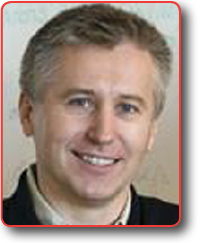 Andrej
Sali is a Professor of Computational Biology in the Department of
Bioengineering and Therapeutic Sciences, Department of
Pharmaceutical Chemistry, School of Pharmacy, University of
California, San Francisco, and California Institute for Quantitative
Biosciences. Sali completed his doctorate in molecular biophysics at
the University of London, United Kingdom. His research is focused on
developing and applying computational methods based on the laws of
physics and rules of evolution to predict protein structures,
determine the structures of macromolecules, and annotate protein
functions based on their structures. Sali has published over 300
papers, many of which are highly cited, and he has served the
computational biology community as a member of several editorial
boards, including PLOS Computational Biology and
Molecular and Cellular Proteomics. Andrej
Sali is a Professor of Computational Biology in the Department of
Bioengineering and Therapeutic Sciences, Department of
Pharmaceutical Chemistry, School of Pharmacy, University of
California, San Francisco, and California Institute for Quantitative
Biosciences. Sali completed his doctorate in molecular biophysics at
the University of London, United Kingdom. His research is focused on
developing and applying computational methods based on the laws of
physics and rules of evolution to predict protein structures,
determine the structures of macromolecules, and annotate protein
functions based on their structures. Sali has published over 300
papers, many of which are highly cited, and he has served the
computational biology community as a member of several editorial
boards, including PLOS Computational Biology and
Molecular and Cellular Proteomics.
top |

